初中英语学科各年级失分原因
- 格式:docx
- 大小:20.92 KB
- 文档页数:2
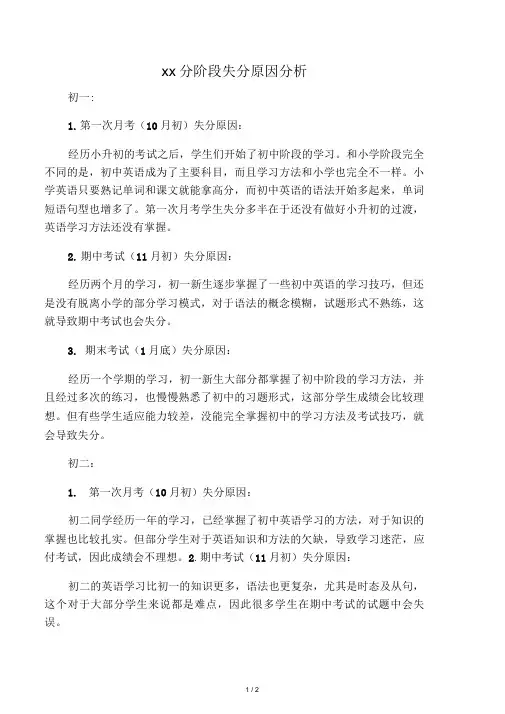
xx分阶段失分原因分析初一:1.第一次月考(10月初)失分原因:经历小升初的考试之后,学生们开始了初中阶段的学习。
和小学阶段完全不同的是,初中英语成为了主要科目,而且学习方法和小学也完全不一样。
小学英语只要熟记单词和课文就能拿高分,而初中英语的语法开始多起来,单词短语句型也增多了。
第一次月考学生失分多半在于还没有做好小升初的过渡,英语学习方法还没有掌握。
2.期中考试(11月初)失分原因:经历两个月的学习,初一新生逐步掌握了一些初中英语的学习技巧,但还是没有脱离小学的部分学习模式,对于语法的概念模糊,试题形式不熟练,这就导致期中考试也会失分。
3.期末考试(1月底)失分原因:经历一个学期的学习,初一新生大部分都掌握了初中阶段的学习方法,并且经过多次的练习,也慢慢熟悉了初中的习题形式,这部分学生成绩会比较理想。
但有些学生适应能力较差,没能完全掌握初中的学习方法及考试技巧,就会导致失分。
初二:1.第一次月考(10月初)失分原因:初二同学经历一年的学习,已经掌握了初中英语学习的方法,对于知识的掌握也比较扎实。
但部分学生对于英语知识和方法的欠缺,导致学习迷茫,应付考试,因此成绩会不理想。
2.期中考试(11月初)失分原因:初二的英语学习比初一的知识更多,语法也更复杂,尤其是时态及从句,这个对于大部分学生来说都是难点,因此很多学生在期中考试的试题中会失误。
3.期末考试(1月底)失分原因:初二开始,考试要逐步向中考靠拢,尤其考察学生阅读能力,而很多学生的阅读量小,会导致阅读失分多,直接导致整份试卷的得分低。
初三:1.第一次月考(10月初)失分原因:初三第一次月考仍然是对于初三部分课本知识以及英语综合运用能力的考察,因此,如果学生初一初二知识欠缺、能力没有培养起来,会导致第一次月考的失利。
2.期中考试(11月初)失分原因:期中考试仍然主要考察学生对于初三课本知识以及英语综合运用能力的考察,另外题型及难度逐渐与中考接近,所以学生的基础知识和对于题型的把握起着很重要的作用。

浅谈初中生英语学习过程中的两极分化随着国际交流的日益频繁和全球化的加速发展,英语作为全球通用语言已经成为各国教育体系中不可或缺的一部分。
在中国,英语学习从小学开始,但是随着学生年级的增加,英语学习的难度和复杂度也在逐步提高。
初中生英语学习过程中存在着明显的两极分化现象,一些学生在英语学习方面取得了较好的成绩,而另一些学生则在英语学习中面临着种种困难。
本文将从英语学习的特点、两极分化的原因以及解决方法三个方面进行浅谈。
我们来分析一下初中生英语学习中的两极分化原因。
学习环境的差异是导致两极分化的重要原因之一。
一些学生可能处在优越的学习环境中,父母有意识地给予学生英语学习的辅导和指导,学生也能够接触到更多的英语学习资源。
另一些学生可能由于家庭条件的限制,无法获得良好的英语学习环境。
学习动机和目标的不同也是导致学习两极分化的原因之一。
有些学生可能对英语学习充满了热情和动力,他们积极主动地参与到英语学习中,勤奋地探索学习方法,不断充实和提高自己。
而另一些学生可能没有明确的学习目标和动机,他们对英语学习没有兴趣,学习动力和积极性较低,难以取得好成绩。
我们来探讨一下如何解决初中生英语学习中的两极分化问题。
学校应该重视英语学习的全面发展,培养学生的兴趣和学习动力。
学校可以通过举办英语角、组织英语演讲比赛、开设英语兴趣小组等活动,增加学生学习英语的趣味性和乐趣,从而提高学生的学习积极性。
学校可以加强英语教学的个性化和针对性,根据学生的不同程度和特点,采取差异化的教学方式和方法,提供更多的学习资源和指导,帮助学生克服英语学习中的困难。
学校可以加强与家长的沟通和合作,让家长了解学生在英语学习中的表现和问题,共同协助学生克服困难,提高学习成绩。
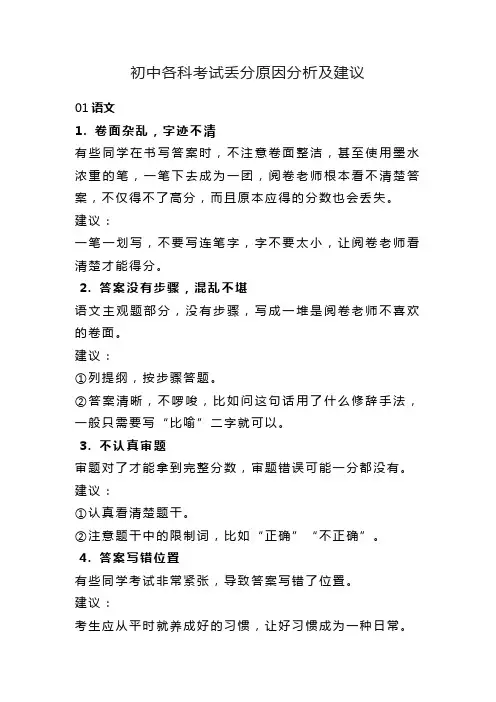
初中各科考试丢分原因分析及建议01语文1. 卷面杂乱,字迹不清有些同学在书写答案时,不注意卷面整洁,甚至使用墨水浓重的笔,一笔下去成为一团,阅卷老师根本看不清楚答案,不仅得不了高分,而且原本应得的分数也会丢失。
建议:一笔一划写,不要写连笔字,字不要太小,让阅卷老师看清楚才能得分。
2. 答案没有步骤,混乱不堪语文主观题部分,没有步骤,写成一堆是阅卷老师不喜欢的卷面。
建议:①列提纲,按步骤答题。
②答案清晰,不啰唆,比如问这句话用了什么修辞手法,一般只需要写“比喻”二字就可以。
3. 不认真审题审题对了才能拿到完整分数,审题错误可能一分都没有。
建议:①认真看清楚题干。
②注意题干中的限制词,比如“正确”“不正确”。
4. 答案写错位置有些同学考试非常紧张,导致答案写错了位置。
建议:考生应从平时就养成好的习惯,让好习惯成为一种日常。
5. 时间安排不合理,题做不完做题慢的同学,前面题正确率很高,但是后面分值大的题反而由于时间不够来不及答题,正是丢了西瓜捡了芝麻。
建议:按照试题分数分配做题时间,比如考试前40分钟做客观题,开考后40-90分钟做主观题,最后一小时做作文。
02数学6.“跳步”答题有一些同学看到这个题自己会做,就放松警惕,跳步答题,导致不必要的失分。
建议:平时和考试都遵循“绝不跳步”的原则。
7. 数学符号书写不规范数学符号是有严格规定的,一定要规范书写。
建议:想清楚自己要使用的符号,再下笔,平时注意对照课本,不放过细节。
8. 计算出错比如数学的证明题,一个步骤错了下面的证明也得不了分。
建议:①数学计算要步步都认真。
②数学大题一定要留出检查时间。
③加强计算练习。
03英语9. 字迹潦草英语和语文一样,都非常重书写规范,字迹潦草的同学英语作文会非常吃亏。
建议:①一笔一划写,力争让阅卷老师看清楚。
②平时注意书写训练,每天花上10分钟训练,好的书写在中考中也是加分项。
10. 听力不好影响后面答题有些同学不懂得取舍,一道听力题没听清就一直纠结,后面题也做不好。
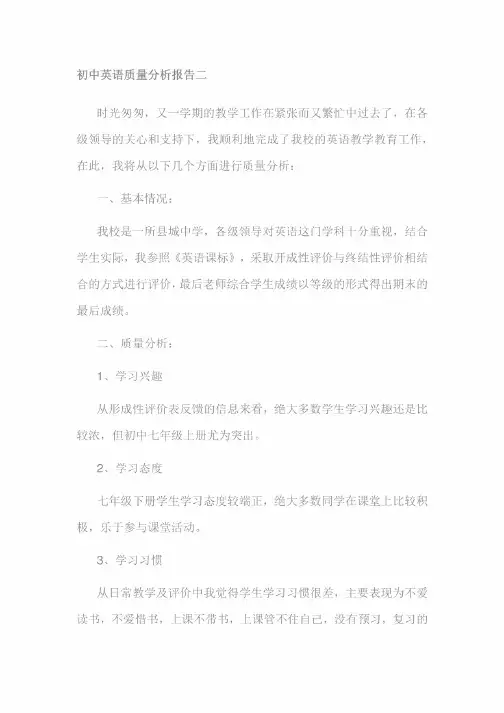
初中英语质量分析报告二时光匆匆,又一学期的教学工作在紧张而又繁忙中过去了,在各级领导的关心和支持下,我顺利地完成了我校的英语教学教育工作,在此,我将从以下几个方面进行质量分析:一、基本情况:我校是一所县城中学,各级领导对英语这门学科十分重视,结合学生实际,我参照《英语课标》,采取开成性评价与终结性评价相结合的方式进行评价,最后老师综合学生成绩以等级的形式得出期末的最后成绩。
二、质量分析:1、学习兴趣从形成性评价表反馈的信息来看,绝大多数学生学习兴趣还是比较浓,但初中七年级上册尤为突出。
2、学习态度七年级下册学生学习态度较端正,绝大多数同学在课堂上比较积极,乐于参与课堂活动。
3、学习习惯从日常教学及评价中我觉得学生学习习惯很差,主要表现为不爱读书,不爱惜书,上课不带书,上课管不住自己,没有预习,复习的习惯。
作业不完成,上课合作学习意识淡漠,上课随意说汉语,突出表现在七年级普通班(1),对学生习惯的培养有待提高。
4、学习方法和策略通过对合作学习教学模式的运用,大多数同学具有一定的合作学习意识,有少数学生能自觉预习,复习,买磁带听,买碟子看,课后也能主动请教老师,并自觉与班上同学比一比谁最棒。
5、学习效果总的来说,我校同学英语学习较为理想,尤其是初中年级七(2)班对话的能力,特别是口语交际的能力较好,七1班有待提高,多数学生听说单词歌曲歌谣掌握很好,七年级书写有待提高。
三、取得的成绩及不足七年级时,自身在市优质课评比中获得一等奖。
但也看到自身素质有待提高,教学方法和方式还需不断充实......综合所述,在本期教学工作中有得也有失,今后在工作中争取做得更好。
时光匆匆,一学期的教学工作在紧张而又繁忙中过去了,在各级领导的关心和支持下,我顺利地完成了我校的英语教学教育工作,在此,我将从以下几个方面进行质量分析:一、基本情况:我校是一所县城中学,各级领导对英语这门学科十分重视,结合学生实际,我参照《英语课标》,采取开成性评价与终结性评价相结合的方式进行评价,最后老师综合学生成绩以等级的形式得出期末的最后成绩。
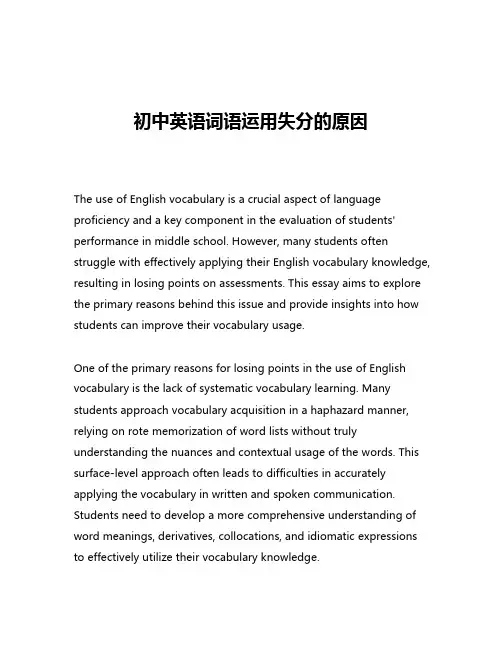
初中英语词语运用失分的原因The use of English vocabulary is a crucial aspect of language proficiency and a key component in the evaluation of students' performance in middle school. However, many students often struggle with effectively applying their English vocabulary knowledge, resulting in losing points on assessments. This essay aims to explore the primary reasons behind this issue and provide insights into how students can improve their vocabulary usage.One of the primary reasons for losing points in the use of English vocabulary is the lack of systematic vocabulary learning. Many students approach vocabulary acquisition in a haphazard manner, relying on rote memorization of word lists without truly understanding the nuances and contextual usage of the words. This surface-level approach often leads to difficulties in accurately applying the vocabulary in written and spoken communication. Students need to develop a more comprehensive understanding of word meanings, derivatives, collocations, and idiomatic expressions to effectively utilize their vocabulary knowledge.Another contributing factor is the disconnect between the vocabulary taught in the classroom and the vocabulary required in assessment contexts. While teachers strive to cover the core vocabulary specified in the curriculum, the actual vocabulary used in examinations may not always align with the classroom instruction. This mismatch can be particularly challenging for students, as they may struggle to recognize and apply the appropriate vocabulary in the specific assessment scenarios. To address this issue, educators should aim to provide students with opportunities to practice using a wider range of vocabulary, including words that may appear in assessments, to better prepare them for the demands of the examinations.Furthermore, the complexity of the English language itself can pose challenges for middle school students. The English language is renowned for its nuanced and often irregular grammar rules, as well as its extensive vocabulary that includes synonyms, homophones, and words with multiple meanings. This linguistic complexity can lead to confusion and misunderstandings, causing students to make mistakes in their vocabulary usage. Providing students with a deeper understanding of the intricacies of the English language, including the contextual and grammatical considerations, can help them navigate these challenges more effectively.Another factor contributing to the loss of points in vocabulary usageis the lack of exposure to authentic language use. Many students' primary exposure to English is limited to the classroom setting, where the language may be presented in a more formal and academic manner. However, in real-world communication, language usage can be more colloquial, idiomatic, and context-dependent. Without opportunities to engage with English in diverse settings, students may struggle to apply their vocabulary knowledge in practical situations, leading to errors in assessments.Additionally, the influence of the students' native language can also play a role in vocabulary-related issues. When students try to directly translate words or expressions from their native language to English, they may inadvertently use inappropriate or incorrect vocabulary, leading to lost points. Addressing these cross-linguistic challenges and helping students develop a deeper understanding of the nuances between their native language and English can improve their vocabulary usage.Finally, the lack of regular practice and feedback can hinder students' progress in effectively using English vocabulary. Vocabulary development is an ongoing process that requires consistent practice, exposure to new words, and constructive feedback from teachers. Without these elements, students may not have the opportunity to identify their weaknesses, receive guidance on improvement, and reinforce their vocabulary knowledge.To address these challenges and improve students' vocabulary usage in middle school, a multifaceted approach is necessary. Firstly, educators should emphasize the importance of systematic vocabulary learning, encouraging students to engage in activities that promote deeper understanding, such as exploring word origins, analyzing word roots and affixes, and practicing contextual usage. Additionally, teachers should strive to align the vocabulary taught in the classroom with the vocabulary used in assessments, ensuring that students are well-prepared for the specific demands of the examinations.Furthermore, educators should provide students with ample opportunities to practice using English vocabulary in diverse contexts, both within the classroom and through extracurricular activities. This exposure to authentic language use can help students develop a better understanding of the nuances and appropriate application of vocabulary.Moreover, teachers should address the linguistic complexities of the English language, offering explicit instruction and guidance on grammar rules, idiomatic expressions, and the contextual considerations of vocabulary usage. By enhancing students' understanding of the English language's intricacies, they can better navigate the challenges of accurate vocabulary application.Finally, regular feedback and personalized support from teachers can play a crucial role in helping students identify their weaknesses, receive targeted guidance, and continuously improve their vocabulary usage. This individualized approach can empower students to take ownership of their learning and develop effective strategies for vocabulary development.In conclusion, the loss of points in the use of English vocabulary in middle school assessments can be attributed to a combination of factors, including the lack of systematic vocabulary learning, the disconnect between classroom instruction and assessment demands, the inherent complexities of the English language, the influence of the native language, and the insufficient practice and feedback. By addressing these challenges through a comprehensive and student-centered approach, educators can help middle school students enhance their vocabulary usage, leading to improved performance and greater academic success.。
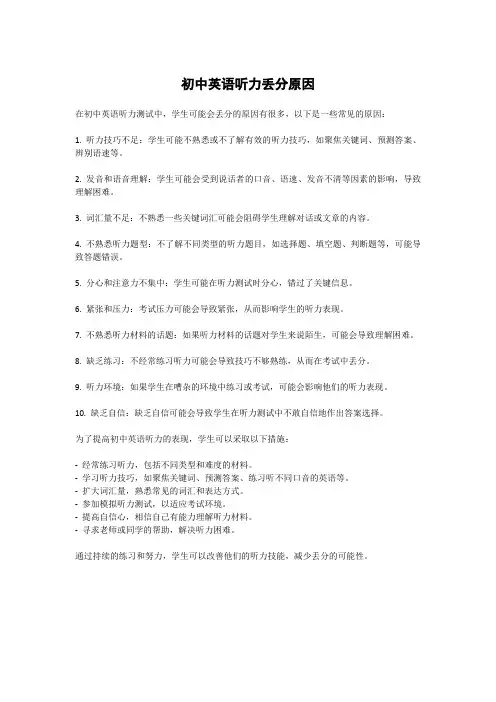
初中英语听力丢分原因
在初中英语听力测试中,学生可能会丢分的原因有很多,以下是一些常见的原因:
1. 听力技巧不足:学生可能不熟悉或不了解有效的听力技巧,如聚焦关键词、预测答案、辨别语速等。
2. 发音和语音理解:学生可能会受到说话者的口音、语速、发音不清等因素的影响,导致理解困难。
3. 词汇量不足:不熟悉一些关键词汇可能会阻碍学生理解对话或文章的内容。
4. 不熟悉听力题型:不了解不同类型的听力题目,如选择题、填空题、判断题等,可能导致答题错误。
5. 分心和注意力不集中:学生可能在听力测试时分心,错过了关键信息。
6. 紧张和压力:考试压力可能会导致紧张,从而影响学生的听力表现。
7. 不熟悉听力材料的话题:如果听力材料的话题对学生来说陌生,可能会导致理解困难。
8. 缺乏练习:不经常练习听力可能会导致技巧不够熟练,从而在考试中丢分。
9. 听力环境:如果学生在嘈杂的环境中练习或考试,可能会影响他们的听力表现。
10. 缺乏自信:缺乏自信可能会导致学生在听力测试中不敢自信地作出答案选择。
为了提高初中英语听力的表现,学生可以采取以下措施:
-经常练习听力,包括不同类型和难度的材料。
-学习听力技巧,如聚焦关键词、预测答案、练习听不同口音的英语等。
-扩大词汇量,熟悉常见的词汇和表达方式。
-参加模拟听力测试,以适应考试环境。
-提高自信心,相信自己有能力理解听力材料。
-寻求老师或同学的帮助,解决听力困难。
通过持续的练习和努力,学生可以改善他们的听力技能,减少丢分的可能性。
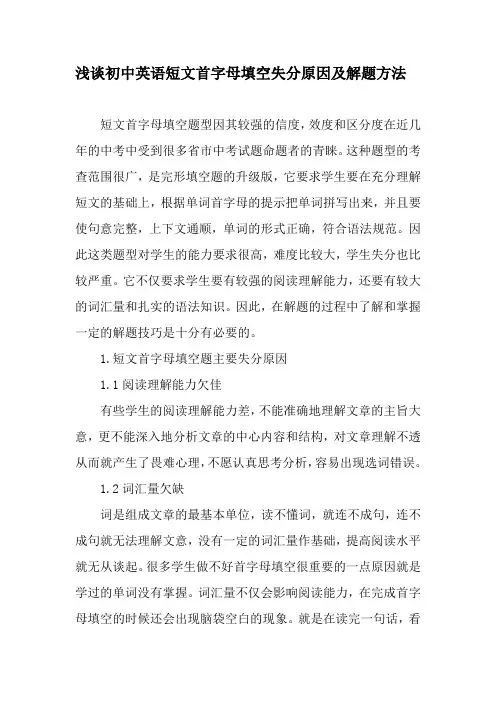
浅谈初中英语短文首字母填空失分原因及解题方法短文首字母填空题型因其较强的信度,效度和区分度在近几年的中考中受到很多省市中考试题命题者的青睐。
这种题型的考查范围很广,是完形填空题的升级版,它要求学生要在充分理解短文的基础上,根据单词首字母的提示把单词拼写出来,并且要使句意完整,上下文通顺,单词的形式正确,符合语法规范。
因此这类题型对学生的能力要求很高,难度比较大,学生失分也比较严重。
它不仅要求学生要有较强的阅读理解能力,还要有较大的词汇量和扎实的语法知识。
因此,在解题的过程中了解和掌握一定的解题技巧是十分有必要的。
1.短文首字母填空题主要失分原因1.1阅读理解能力欠佳有些学生的阅读理解能力差,不能准确地理解文章的主旨大意,更不能深入地分析文章的中心内容和结构,对文章理解不透从而就产生了畏难心理,不愿认真思考分析,容易出现选词错误。
1.2词汇量欠缺词是组成文章的最基本单位,读不懂词,就连不成句,连不成句就无法理解文意,没有一定的词汇量作基础,提高阅读水平就无从谈起。
很多学生做不好首字母填空很重要的一点原因就是学过的单词没有掌握。
词汇量不仅会影响阅读能力,在完成首字母填空的时候还会出现脑袋空白的现象。
就是在读完一句话,看到首字母的时候,脑海里完全想不出这个词应该是什么,也会影响对上下文的理解。
1.3常用的固定短语和句型掌握不熟掌握了大量的词汇并不说明就能读懂英语文章,还要掌握句法知识。
句法知识掌握不好的考生很难理清头绪,无法理解。
因此在首字母填空的题目中有很多会考查到一些固定短语或者句型,如果在解题时能够第一时间看出此处是某个固定短语,这就为解题降低了难度并对上下文的理解有很大的帮助。
1.4语法知识薄弱,知识面狭窄很多学生有的时候填对了词,但是因为没有考虑到时态,人称,词性及词形的变化,导致用对了词却没有顾全语法知识而失分,这种错误是最让人感到可惜的。
首字母填空的短文选材范围很广,它可能是说明文,记叙文,议论文,也有可能是科普知识或是名人传记,地理文化等,如果在平时的学习中注重知识面的扩展,在解题时也会有很大的帮助。
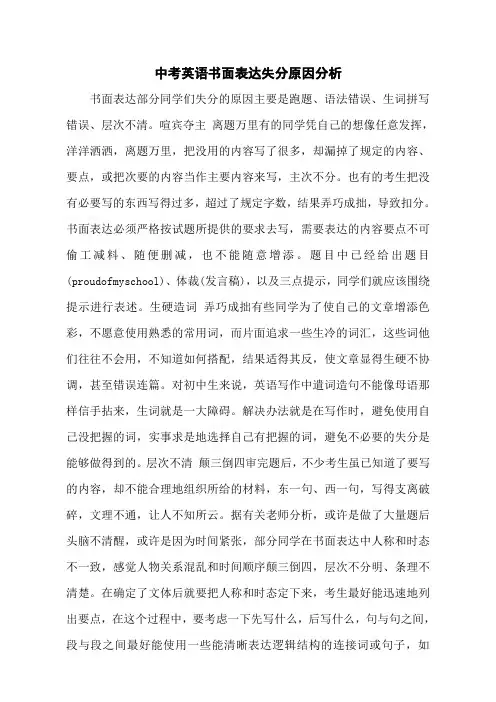
中考英语书面表达失分原因分析
书面表达部分同学们失分的原因主要是跑题、语法错误、生词拼写错误、层次不清。
喧宾夺主离题万里有的同学凭自己的想像任意发挥,洋洋洒洒,离题万里,把没用的内容写了很多,却漏掉了规定的内容、要点,或把次要的内容当作主要内容来写,主次不分。
也有的考生把没有必要写的东西写得过多,超过了规定字数,结果弄巧成拙,导致扣分。
书面表达必须严格按试题所提供的要求去写,需要表达的内容要点不可偷工减料、随便删减,也不能随意增添。
题目中已经给出题目(proudofmyschool)、体裁(发言稿),以及三点提示,同学们就应该围绕提示进行表述。
生硬造词弄巧成拙有些同学为了使自己的文章增添色彩,不愿意使用熟悉的常用词,而片面追求一些生冷的词汇,这些词他们往往不会用,不知道如何搭配,结果适得其反,使文章显得生硬不协调,甚至错误连篇。
对初中生来说,英语写作中遣词造句不能像母语那样信手拈来,生词就是一大障碍。
解决办法就是在写作时,避免使用自己没把握的词,实事求是地选择自己有把握的词,避免不必要的失分是能够做得到的。
层次不清颠三倒四审完题后,不少考生虽已知道了要写的内容,却不能合理地组织所给的材料,东一句、西一句,写得支离破碎,文理不通,让人不知所云。
据有关老师分析,或许是做了大量题后头脑不清醒,或许是因为时间紧张,部分同学在书面表达中人称和时态不一致,感觉人物关系混乱和时间顺序颠三倒四,层次不分明、条理不清楚。
在确定了文体后就要把人称和时态定下来,考生最好能迅速地列出要点,在这个过程中,要考虑一下先写什么,后写什么,句与句之间,段与段之间最好能使用一些能清晰表达逻辑结构的连接词或句子,如。
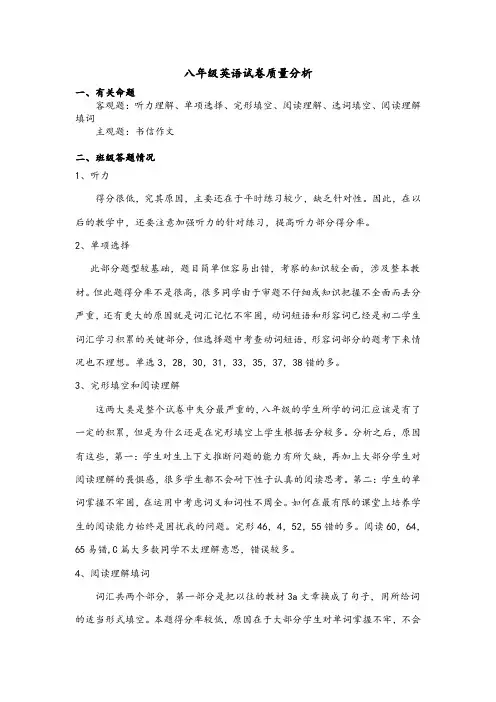
八年级英语试卷质量分析一、有关命题客观题:听力理解、单项选择、完形填空、阅读理解、选词填空、阅读理解填词主观题:书信作文二、班级答题情况1、听力得分很低,究其原因,主要还在于平时练习较少,缺乏针对性。
因此,在以后的教学中,还要注意加强听力的针对练习,提高听力部分得分率。
2、单项选择此部分题型较基础,题目简单但容易出错,考察的知识较全面,涉及整本教材。
但此题得分率不是很高,很多同学由于审题不仔细或知识把握不全面而丢分严重,还有更大的原因就是词汇记忆不牢固,动词短语和形容词已经是初二学生词汇学习积累的关键部分,但选择题中考查动词短语,形容词部分的题考下来情况也不理想。
单选3,28,30,31,33,35,37,38错的多。
3、完形填空和阅读理解这两大类是整个试卷中失分最严重的,八年级的学生所学的词汇应该是有了一定的积累,但是为什么还是在完形填空上学生根据丢分较多。
分析之后,原因有这些,第一:学生对生上下文推断问题的能力有所欠缺,再加上大部分学生对阅读理解的畏惧感,很多学生都不会耐下性子认真的阅读思考。
第二:学生的单词掌握不牢固,在运用中考虑词义和词性不周全。
如何在最有限的课堂上培养学生的阅读能力始终是困扰我的问题。
完形46,4,52,55错的多。
阅读60,64,65易错,C篇大多数同学不太理解意思,错误较多。
4、阅读理解填词词汇共两个部分,第一部分是把以往的教材3a文章换成了句子,用所给词的适当形式填空。
本题得分率较低,原因在于大部分学生对单词掌握不牢,不会灵活变通,尤其动词短语掌握很不牢固。
第二部分部分难度相对较大,初中学生的能力还很难达到看着首字母把英文完整的给出来,并且还要运用和考虑相应的时态句型,他们所得的分数很低,这题只有个别基础较好的可以得到少部分的分数。
5.书面表达书面表达最注重学生的综合运用能力及自主创造灵活发挥能。
此题题目是给定题目来写作,对于此题,基础好的同学也没有得高分,大部分同学基本没分。
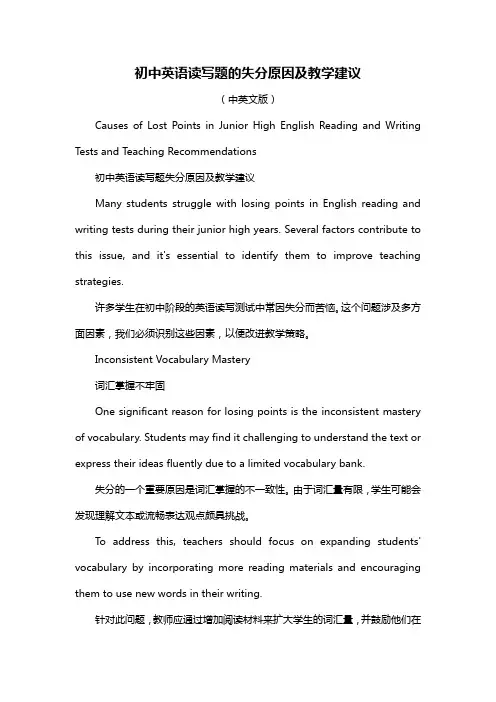
初中英语读写题的失分原因及教学建议(中英文版)Causes of Lost Points in Junior High English Reading and Writing Tests and Teaching Recommendations初中英语读写题失分原因及教学建议Many students struggle with losing points in English reading and writing tests during their junior high years. Several factors contribute to this issue, and it's essential to identify them to improve teaching strategies.许多学生在初中阶段的英语读写测试中常因失分而苦恼。
这个问题涉及多方面因素,我们必须识别这些因素,以便改进教学策略。
Inconsistent Vocabulary Mastery词汇掌握不牢固One significant reason for losing points is the inconsistent mastery of vocabulary. Students may find it challenging to understand the text or express their ideas fluently due to a limited vocabulary bank.失分的一个重要原因是词汇掌握的不一致性。
由于词汇量有限,学生可能会发现理解文本或流畅表达观点颇具挑战。
To address this, teachers should focus on expanding students' vocabulary by incorporating more reading materials and encouraging them to use new words in their writing.针对此问题,教师应通过增加阅读材料来扩大学生的词汇量,并鼓励他们在写作中运用新词汇。
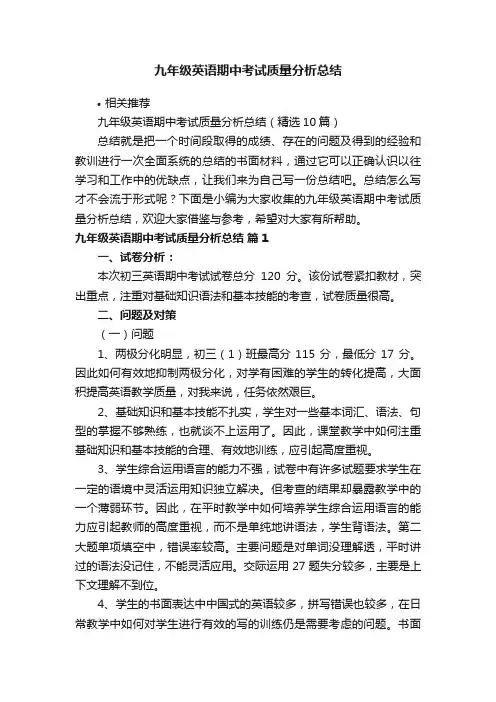
九年级英语期中考试质量分析总结•相关推荐九年级英语期中考试质量分析总结(精选10篇)总结就是把一个时间段取得的成绩、存在的问题及得到的经验和教训进行一次全面系统的总结的书面材料,通过它可以正确认识以往学习和工作中的优缺点,让我们来为自己写一份总结吧。
总结怎么写才不会流于形式呢?下面是小编为大家收集的九年级英语期中考试质量分析总结,欢迎大家借鉴与参考,希望对大家有所帮助。
九年级英语期中考试质量分析总结篇1一、试卷分析:本次初三英语期中考试试卷总分120分。
该份试卷紧扣教材,突出重点,注重对基础知识语法和基本技能的考查,试卷质量很高。
二、问题及对策(一)问题1、两极分化明显,初三(1)班最高分115分,最低分17分。
因此如何有效地抑制两极分化,对学有困难的学生的转化提高,大面积提高英语教学质量,对我来说,任务依然艰巨。
2、基础知识和基本技能不扎实,学生对一些基本词汇、语法、句型的掌握不够熟练,也就谈不上运用了。
因此,课堂教学中如何注重基础知识和基本技能的合理、有效地训练,应引起高度重视。
3、学生综合运用语言的能力不强,试卷中有许多试题要求学生在一定的语境中灵活运用知识独立解决。
但考查的结果却暴露教学中的一个薄弱环节。
因此,在平时教学中如何培养学生综合运用语言的能力应引起教师的高度重视,而不是单纯地讲语法,学生背语法。
第二大题单项填空中,错误率较高。
主要问题是对单词没理解透,平时讲过的语法没记住,不能灵活应用。
交际运用27题失分较多,主要是上下文理解不到位。
4、学生的书面表达中中国式的英语较多,拼写错误也较多,在日常教学中如何对学生进行有效的写的训练仍是需要考虑的问题。
书面表达中学生的主要错误有:1)在句子翻译时不尊重原句的中文意思,改变了句意,句式结构使用错误;2)不会用英语思考,用英语表达的能力较差,出现了很多汉语英语;3)没有打草稿的习惯,导致思路不清晰,结构不分明,内容不知所云;4)语言的基本功不扎实,病句较多;5)有部分学生书写习惯不好,卷面不整洁。
初中英语考试反思500字初中英语考试反思500字篇一这次期中考试,学生英语成绩很不理想,两极分化十分明显,部分语法知识的掌握不够牢固,尤其是个别题反复做过几次也没能把握好,阅读理解能力和书面表达能力比较弱。
具体有以下几点:1.部分学生的基础知识不够扎实,学生遗忘知识快,过去滚瓜烂熟的东西一段时间不用就忘了。
2.学生的应变能力有待提高,不能正确写出单词的正确形式。
3.理解能力不强,阅读理解失分较多,不能理解通篇大意。
4.不能熟练运用学过的句型。
造成这种结果的原因是多方面的,但最重要的有下面几方面:1.对学生要求不够严格;部分学生偷懒。
2.没能充分调动学生的积极性;提高课堂教学效率。
3. 典型题讲解不够,训练不到位。
4.平时检查督促力度不够。
在今后的教学中,1、继续抓好双基知识的训练,打牢基本功。
2、引导学生梳理知识,掌握语法规则,逐步引导学生灵活运用英语知识的能力。
3、培养学生上课时的听课习惯,要求学生全神贯注,要和老师同步思考出现的问题。
4、讲课时,尽量使用简明、准确、形象、生动的语言,坚持用英语教学,让学生用英语来想英语。
5、在平时要通过阅读,培养学生阅读多种文体的能力,如何从*中获取信息的能力和运用英语解决实际问题的能力。
在训练中要注意方法的多样化和灵活性,同时,启发他们学会运用多种不同的方法来表达同样的思想,逐步培养良好的英语语感。
6、设计全面、高校的课外作业,并进一步培养学生良好的书写习惯,做到整洁、规范,正确地书写;每周写一篇作文。
7、在教学过程中,还需加大学习力度,积极研究探索教学方法并及时改变,就一定能提高整体英语水平。
初中英语考试反思500字篇二本次英语命题是八年级备课组命题,以考查基础知识为主,在此基础上考查学生综合运用语言的能力。
命题材料贴近学生生活,难度适中。
期中听力题,短文首字母填空和书面表达失分较多。
我所教两个班级在均分,及格率和优秀率上都比较接近,均分60分左右,八(1)班19个及格、高分9个,八(2)班21个及格、11个高分。
2023年初中英语考试反思4篇初中英语考试反思1本次八年级英语月考从试卷上看考察知识面较广,题型较丰富,灵活运用程度接近中考。
题的难易程度适中。
题出得比较好,但学生答得不好,高分不多,平均分较差,主要存在以下几方面问题:1、选择题失分原因学生对知识点的掌握不准确不扎实,再加上审题不仔细,导致学生自己认为会得题没有拿分。
2、介词填空题学生没有对介词准确熟练掌握。
3、正确形式填空题学生没有达到灵活运用,答案准确无误。
平时练得少。
4、根据汉语意思填空题和连词成句题,学生对书上的重点句掌握不熟。
5、句型转换题第五题学生对易混知识点不清楚,甚至不会。
平时强调得少练得少。
6、完型填空和阅读理解学生失分最多。
原因是学生词汇量太少看不懂,更不能正确理解__内容,平时对学生指导的太少。
7、写作能力太差,平时练得少,教师指导的也不够。
今后的教学我想从以下几方面改进:1、提高课堂教学质量,备课一定要充分,教学方法灵活多样,多与其他教师交流,加强集体备课,资源共享。
2、加强课下对学生的追踪力度,采用“兵教兵”“兵追兵”。
3、加大对重点知识的练习力度,练得学生一看就知道答案。
4、完型填空和阅读理解平时多加强对学生的做题指导,主要是方法指导。
每天让学生背十个单词,翻译五个句子。
5。
写作方面多练多批多改。
初中英语考试反思2本次考试主要考查八年级上1—3单元的内容,总分150分,时间90分钟。
题型分为客观性试题(即选择题,包括听力、单项选择、句型转换和完型填空、阅读理解)和主观性试题(即非选择题,包括方框中选词填空、完成对话、完成译句和作文)。
试卷紧扣教材,设题阶梯性好,难易相当。
注重基础和能力相结合。
能力题有一定拓展。
有一定的深度和广度。
同时也兼顾上学期的部分内容。
这样有利于突出学生主体,尊重学生的个体差异。
从学生答题情况来看,主要存在以下问题:1、两极分化情况比上学期更严重。
2、基础知识不扎实。
缺漏多,遗忘率高。
如在基础部分的单词填空第4题,只知道空格缺动词,但不进一步考虑填入动词需要注意人称,数,时态的变化,五分之四左右的同学就填写了stay这个单词,另外对常用短语不熟悉,比如句型转换第9题二分之一的同学没有记住be different from这个常用短语。
八年级英语试卷家长分析失分原因和改进措施本次试卷信息量大,知识涵盖面广,渗透性强,注重实际情景和具体语境中考查学生对基础知识的理解和运用,有较强的探究性和灵活性。
试卷突出了语言的交际功能,力求体现课程标准精神,无偏、难和怪题。
试题的选材有必须的时代感和知识性,在选材中既注意了所选材料在题材和体裁上的多样性,又注意了所选材料的思想性和教育性注重教育性。
试卷着重考查学生理解、运用语言的本事,重视考查学生的英语基础知识、基本技能,考查学生运用所学的知识和技分析问题、解决问题的本事,力求体现选拔和指导教学两者并重。
一、试卷特点:1、试卷注重基础,体现活用,难度和区分度恰当无偏题,怪题出现。
试题注重考查学生在必须语境下对语言基础知识的掌握情景和综合运用英语的本事。
语言基础知识的考查重点突出、覆盖面广;情景设置合理,避免了纯知识性的死记硬背题;词汇和语法的测试充分注意了语言的真实性、趣味性和实践性;注重语感,灵活性强,突出语言形式向语言意义的转化。
2、试题从知识立意逐渐向本事立意转变。
加大了本事考查的比重。
试题突出了语言的交际性,强调在特定的语境中英语知识的灵活运用。
适当增加了测试词汇量,加强本事检测。
如阅读理解考查的资料注重了对学生在语境中运用语言本事的考查。
加大了对语言的熟练程度和深层次本事考查的力度。
如“阅读理解”部分注重了对归纳,推断和猜测整个句子等深层次本事的考查。
阅读材料贴近生活,同时题材广泛,体裁多样、生动趣味,并富有思想性。
3、书面表达难度控制合理。
书面表达给学生留有充分发挥本事的空间,加大了考查学生综合运用语言本事的力度,使试卷更具现实性。
书面表达题对初中英语教学有着良好的导向作用,要求学生要充分运用所学语言记录自我的真实情感,进一步体现了英语学科的交际性和工具性。
二、试题分析第一题:听力部分第一大题中5个小题,相当基础,主要考查学生的基础知识掌握得如何,第二、三、四大题,则逐步地增大难度,人物主角的转换、地点的转移这要求学生要学会用英语思维研究问题,否则听力节奏跟不上,这暗示学生平时学英语,要慢慢锻炼自我学会用英语进行思考问题的本事。
初中英语主要失分点中考的脚步越来越近了,作为老师,我们和同学们的心情是一样的,都在争分夺秒地备考,抓考点,找漏点,助力自己的学生拿高分,进重点。
中考怎样才能稳拿高分?那就是简单题,咱不丢分,难题争取多拿分。
特别是英语上,十分拉差距。
今天给大家盘点英语最容易失分的地方,初三学生收藏!细盘点初三英语的丢分点作文扣分点1.内容方面:要点缺失,可酌情扣分比如中考作文“I want to do something for my school”,若没有写一件具体的事情,是要扣3分以上的;若写的事情太过于虚幻,没有实际内容,也会扣1-2分。
2.字数:少于60字的作文要酌情扣分中考英语作文要求60字以上,标点符号不算,少了就要扣分。
但是60字的作文能不能得高分?从我们拿到的实例作文来看,16分以上的作文,没有少于75字的,甚至少于80字的也少之又少。
当然,也极少有超过100字的,因为中考试卷的短线格一共80个,在格子下面大约还有2行的空间,可以加20字左右,再多阅卷人就很难看清了,也会影响卷面的美观。
所以,同学们如果想让作文得到高分,最好是让字数在75-100字之间。
3.语法和拼写错误每个扣0.5,重复错误一般不计;标点错误:每4个扣0.5。
阅读理解从近几年中考英语来看,考生丢分最多的就是阅读理解和完形填空。
究其原因,一方面这两种题型的难度系数比较高,特别是完型填空达到了0.715,是四类题型中最难的部分;而更重要的原因在于,无论是完型填空还是阅读理解,考查的都不是“单点”,而是考生对语篇的整体理解能力。
由于基础不牢,功底不扎实,尤其是对近义词的区别把握不到位,考生很容易落入丢分“陷阱”。
原因就在于练习不够,对这种题材不熟悉。
考生必须广泛阅读各种题材的材料,还要掌握阅读理解题的思路和技巧英语考试是对学生运用英语的综合能力的考查,同学们在考试的过程当中。
会经常暴露一些弱点、犯一些错误,有效的学习,就是要有意识合理地去规避这些丢分点。
初中英语阅读理解失分原因Reading comprehension in English can be a challenging task for many middle school students. One common reason for losing points is the lack of vocabulary knowledge, which hinders understanding the nuances of the text.Another factor is the inability to infer meaning from context, a skill crucial for grasping the overall message when certain words or phrases are unfamiliar. Students often overlook the importance of pre-reading strategies, such as skimming and scanning, which can set the stage for a deeper understanding of the material.Time management issues also contribute to poor performance. Rushing through passages to finish within a set time limit can lead to superficial reading and missing critical details.Moreover, some students struggle with the structure of the text, failing to identify the main idea or supporting details, which can result in incorrect answers to comprehension questions.Lack of practice is another significant barrier. Regular exposure to a variety of reading materials can enhance comprehension skills, but without it, students may find it difficult to keep up with the demands of the subject.Additionally, the absence of a systematic approach to answering questions can lead to confusion. Students must learn to analyze the question, locate the relevant information in the text, and then formulate a response that directly addresses the query.Lastly, cultural differences can sometimes play a role in comprehension difficulties. English texts may contain idiomatic expressions or cultural references that are unfamiliar to non-native speakers, leading to misunderstandings.Addressing these issues through targeted instruction, practice, and exposure to diverse texts can significantly improve students' performance in English reading comprehension.。
初中英语完型填空失分原因One of the most challenging aspects of learning English for middle school students is the cloze test, also known as the fill-in-the-blank or gap-filling exercise. This type of assessment requires students to identify and insert the appropriate words or phrases into the missing spaces within a given text. While cloze tests are designed to evaluate students' comprehension, vocabulary, and grammar skills, many students often struggle to achieve high scores, leading to frustration and a sense of failure.The primary reason for losing points in middle school English cloze tests is a lack of vocabulary. Students who have not built a strong foundation of English words and their meanings often find it challenging to select the correct options to fill in the blanks. This is particularly true when the text includes more advanced or specialized vocabulary that is not commonly used in everyday conversation. Without a comprehensive understanding of the vocabulary, students may resort to guessing or selecting words that do not fit the context, resulting in incorrect answers.Another factor contributing to poor performance in cloze tests is insufficient reading comprehension skills. Cloze tests require students to understand the overall meaning and flow of the text, as well as the specific context surrounding each blank. If students struggle to grasp the main idea or the relationships between different parts of the passage, they may have difficulty determining the appropriate words to fill in the gaps. Weak reading comprehension can stem from various issues, such as limited exposure to authentic English materials, difficulty in identifying key information, or a lack of strategies for actively engaging with the text.Additionally, grammatical knowledge plays a crucial role in cloze tests. Students who have not fully grasped the rules and structures of the English language may struggle to identify the correct parts of speech, verb tenses, or sentence structures required to complete the blanks. This can be particularly challenging when the text includes complex grammatical structures or idiomatic expressions that do not follow the standard rules.Furthermore, test-taking strategies and anxiety can also contribute to poor performance in cloze tests. Some students may feel overwhelmed by the pressure of the test, leading to panic or a lackof focus. Others may not have developed effective strategies for approaching and completing the cloze test, such as carefully reading the entire passage before attempting to fill in the blanks, usingcontext clues, or eliminating unlikely options.To address these challenges and improve their performance in middle school English cloze tests, students can adopt various strategies and techniques. Firstly, they should focus on expanding their vocabulary by regularly reading a wide range of English materials, using flashcards or vocabulary apps, and practicing word-building exercises. Additionally, they should work on improving their reading comprehension skills by actively engaging with the text, identifying key ideas and relationships, and practicing strategies such as skimming, scanning, and inferencing.Strengthening their grammatical knowledge is also crucial. Students can benefit from regular practice with grammar exercises, focused study of grammatical structures, and exposure to authentic English texts that showcase proper usage. Furthermore, they should familiarize themselves with the format and structure of cloze tests, and develop effective test-taking strategies, such as carefully reading the entire passage, using context clues, and eliminating unlikely options.Moreover, students should not hesitate to seek help from their teachers or tutors when they encounter difficulties in cloze tests. Engaging in one-on-one or small-group discussions can provide valuable insights and personalized guidance to address specificweaknesses and improve their overall performance.In conclusion, the primary reasons for losing points in middle school English cloze tests are a lack of vocabulary, insufficient reading comprehension skills, limited grammatical knowledge, and ineffective test-taking strategies. By addressing these challenges through targeted practice, strategic learning, and seeking support from teachers and peers, students can enhance their performance and gain confidence in this essential aspect of English language assessment.。
xx分阶段失分原因分析
初一:
1.第一次月考(10月初)失分原因:
经历小升初的考试之后,学生们开始了初中阶段的学习。
和小学阶段完全不同的是,初中英语成为了主要科目,而且学习方法和小学也完全不一样。
小学英语只要熟记单词和课文就能拿高分,而初中英语的语法开始多起来,单词短语句型也增多了。
第一次月考学生失分多半在于还没有做好小升初的过渡,英语学习方法还没有掌握。
2.期中考试(11月初)失分原因:
经历两个月的学习,初一新生逐步掌握了一些初中英语的学习技巧,但还是没有脱离小学的部分学习模式,对于语法的概念模糊,试题形式不熟练,这就导致期中考试也会失分。
3、期末考试(1月底)失分原因:
经历一个学期的学习,初一新生大部分都掌握了初中阶段的学习方法,并且经过多次的练习,也慢慢熟悉了初中的习题形式,这部分学生成绩会比较理想。
但有些学生适应能力较差,没能完全掌握初中的学习方法及考试技巧,就会导致失分。
初二:
1.第一次月考(10月初)失分原因:
初二同学经历一年的学习,已经掌握了初中英语学习的方法,对于知识的掌握也比较扎实。
但部分学生对于英语知识和方法的欠缺,导致学习迷茫,应付考试,因此成绩会不理想。
2.期中考试(11月初)失分原因:
初二的英语学习比初一的知识更多,语法也更复杂,尤其是时态及从句,这个对于大部分学生来说都是难点,因此很多学生在期中考试的试题中会失误。
3.期末考试(1月底)失分原因:
初二开始,考试要逐步向中考靠拢,尤其考察学生阅读能力,而很多学生的阅读量小,会导致阅读失分多,直接导致整份试卷的得分低。
初三:
1.第一次月考(10月初)失分原因:
初三第一次月考仍然是对于初三部分课本知识以及英语综合运用能力的考察,因此,如果学生初一初二知识欠缺、能力没有培养起来,会导致第一次月考的失利。
2.期中考试(11月初)失分原因:
期中考试仍然主要考察学生对于初三课本知识以及英语综合运用能力的考察,另外题型及难度逐渐与中考接近,所以学生的基础知识和对于题型的把握起着很重要的作用。
而很多同学这方面欠缺,会有不理想的成绩。
3.期末考试(1月底)失分原因:
初三的期末考试更加注重与中考的接轨,要求学生有扎实的基础及试题分析能力,并为学生总复习指明方向。
因此其失分主要是由于对于课本知识掌握不牢以及对中考的题型及难度把握不准造成的。
xx晶晶。